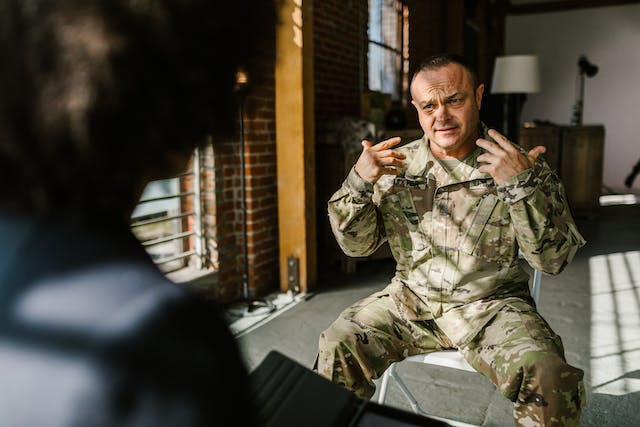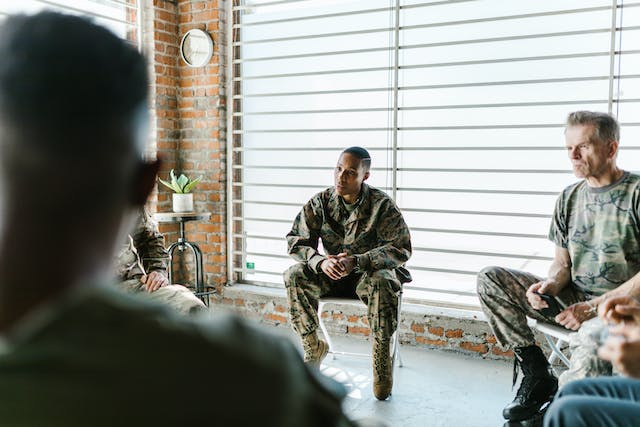
The transition from military to civilian life brings many challenges, some lingering in the quiet hours of the night. For many veterans, the end of their service marks the beginning of a new battle: coping with sleep disorders. These sleep disorders in military veterans are not just common occurrences; they are complex conditions that can significantly impact their overall health and daily functioning. Such disorders range from insomnia to more severe issues like sleep apnea, each carrying its own set of challenges. So, let’s shed light on these sleep disturbances, provide insight into their nature, and learn how to manage them successfully.
PTSD-Related Sleep Disturbances: The Nighttime Battle
For many veterans, the battle doesn’t end upon leaving the battlefield; it continues into the night with PTSD-related sleep disturbances. These disturbances often manifest as nightmares and disrupted sleep, deeply impacting rest quality. Therefore, effectively managing these symptoms is crucial. It involves a combination of professional therapy and good sleep practices. Techniques like exposure therapy or EMDR (Eye Movement Desensitization and Reprocessing) prove beneficial in addressing PTSD.

Alongside this, understanding the link between PTSD and substance abuse is vital. Substance abuse can worsen sleep problems, creating a challenging cycle. Veterans are encouraged to seek support for both issues concurrently. Maintaining a calm sleeping environment and avoiding stimulants can further improve their chances of a restful night. This multifaceted approach can significantly enhance sleep quality, aiding overall healing.
Insomnia: The Persistent Challenge
For vets, insomnia often surfaces during times of significant life changes, such as transitioning back to civilian life or relocating. Imagine a veteran contemplating a move to a bustling city like Washington, D.C. The process of moving and hiring movers, especially in a high-demand area like DC, can add to the stress and anxieties already present in their lives. That is where residential movers in DC come into play, providing a service that, while essential, can also be a source of worry and sleepless nights.
Establishing a calming pre-sleep routine to combat insomnia in such scenarios is ideal, perhaps including meditation or light reading to distract the mind from the day’s stresses. Maintaining a regular sleep schedule also helps ensure a quiet, comfortable sleeping environment. By managing these external stressors effectively, veterans can significantly improve their sleep quality and overall well-being.
Sleep Apnea: The Silent Disruptor
Sleep apnea, a common issue among veterans, often goes unnoticed. Pauses mark this disorder in breathing during sleep. It not only disrupts rest but also poses long-term health risks. The primary treatment is using a CPAP machine. It maintains steady airflow, ensuring uninterrupted breathing.
Lifestyle changes are also pivotal. Losing weight and avoiding alcohol before bedtime can significantly improve symptoms. Regular check-ups are a must. They help track the disorder’s progression and adjust treatments. With the right approach, veterans can manage sleep apnea effectively, leading to better sleep and overall health.
Chronic Pain-Related Sleep Issues: Overcoming Discomfort
Chronic pain can significantly disrupt sleep for veterans. Effective pain management strategies include physical therapy, appropriate pain medications, and alternative treatments like acupuncture.

Chronic pain is a major factor contributing to sleep disorders in military veterans, affecting their sleep quality and daily life.
Creating a comfortable sleeping environment and using supportive pillows aid sleep. Relaxation techniques like deep breathing exercises can also help reduce discomfort and promote better sleep.
Restless Legs Syndrome (RLS) and Periodic Limb Movement Disorder (PLMD): The Restless Sleep
RLS and PLMD are common sleep disorders in military veterans, causing discomfort and involuntary leg movements at night. These conditions disrupt sleep and can lead to daytime fatigue. Regular exercise is beneficial to alleviate symptoms. It improves circulation and reduces leg discomfort. Cutting back on caffeine also helps, as it can worsen symptoms.
For veterans, establishing a consistent sleep schedule is key. It helps the body maintain a regular sleep-wake cycle, which is important for managing these disorders. In some cases, medication may be prescribed to relieve symptoms. With these strategies, veterans can significantly improve their sleep quality and find relief from the restless nights caused by RLS and PLMD.
Circadian Rhythm Disorders: Resetting the Clock
Circadian rhythm disorders disrupt the natural sleep-wake cycle in veterans. Aligning this cycle is key to restoring healthy sleep patterns. Exposure to natural light during the day helps reset the internal clock. Avoiding electronic screens before bedtime is also helpful. It prevents sleep disturbances caused by artificial light.
Sticking to a consistent sleep schedule reinforces the body’s natural rhythms. In some cases, melatonin supplements can aid in this process. They help regulate sleep patterns. Veterans can realign their circadian rhythms by taking these steps, improving sleep quality and overall well-being.
Narcolepsy: Managing Unpredictable Sleepiness
Narcolepsy poses a unique challenge for veterans, characterized by unexpected bouts of sleepiness during the day. This condition demands a proactive management approach. Medications like stimulants or antidepressants are often prescribed to regulate sleep patterns.
However, it’s not just about medication. Lifestyle adjustments play an important role, too. Scheduled napping and a strict sleep routine are helpful for veterans with narcolepsy. They help manage sudden sleep attacks and stay alert. In addition, incorporating mental healthcare for military families into the treatment plan can provide comprehensive support.
 Support groups are vital, especially since conditions like narcolepsy are more common among veterans than generally realized.
Support groups are vital, especially since conditions like narcolepsy are more common among veterans than generally realized.
This holistic approach addresses not only the physical symptoms of narcolepsy but also the psychological aspects, aiding veterans in coping more effectively. Through a combination of medical intervention and lifestyle changes, veterans can significantly mitigate the effects of narcolepsy, improving their daily functioning and quality of life.
Embracing Healthy Sleep Habits
For many veterans, the journey to overcoming sleep disorders is challenging but achievable. Embracing healthy sleep habits, seeking professional help, and leveraging support systems like the National Association of American Veterans can make a significant difference. As our understanding of these sleep disorders in military veterans deepens, so does our ability to offer effective solutions, paving the way for a more restful and fulfilling life post-service.
Author’s bio: Amy Douglas is a seasoned copywriter renowned for her ability to craft compelling narratives that drive engagement and conversion. With a background in marketing and a knack for distilling complex ideas into clear, persuasive copy, she brings a unique blend of creativity and strategic insight to every project. Amy’s portfolio spans diverse industries, showcasing her adaptability and commitment to delivering results that resonate with target audiences.
